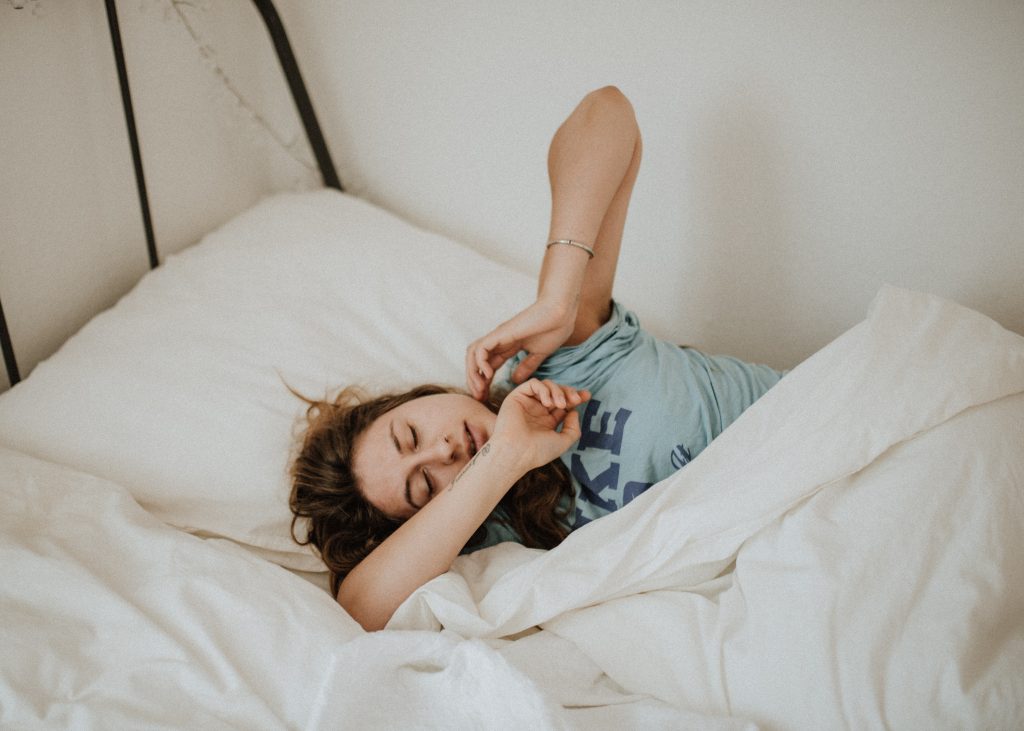
First Things First
Before you spend hours searching for caffeine products or researching “what is Thrive” online, there are some quick habits you can build into your morning to help your brain and body wake up. The first, and easiest, is to drink more water. You might feel like all you hear from doctors and friends is to drink more water and that it solves everything. Well, it sure can help a lot! Drinking water as soon as you wake up can help to nourish your body from the mild dehydration it faces while you’re sleeping. It wakes up your cells and nourishes your organs to get all systems on the move as you get out of bed.
Yoga is another trend that seems all the rage, but it’s because it’s a great, simple way to jumpstart your muscles when you wake up. A soothing morning yoga routine can stretch your muscles that may have gotten tense or stiff during sleep, which releases a host of chemicals into the body telling it to wake up and gear up for the day. It’s a great way to loosen up your body and gently make your mind more alert before you have to start a hectic morning routine. Morning stretches can even help to reduce stress throughout the day because you’ve let go of existing tension and made it easier for your body to process stress.
Perhaps one of the best things you can do to avoid feeling fatigued during the day is to avoid the snooze button. It might seem like man’s greatest invention when you’re startled awake and want just a few more minutes of peace, but in reality it can mess up your sleep cycle and leave you feeling tired all day long. When you hit snooze, you might think you’re going back to sleep, but odds are you’re not actually getting meaningful rest. This put you in a type of sleep limbo where your body wants to rest but your mind has already been roused so you’re not sure if you’re supposed to be asleep or awake. Getting out of bed the first time the alarm goes off can help you to wake up properly and feel more alert during the day.
You’ve surely heard the phrase, “breakfast is the most important meal of the day.” Well, when it comes to waking up and feeling energized, it certainly can be! Eating a high protein breakfast to start your day can give your body the energy and nourishment it needs to start strong. Adding in some healthy carbs and fats can provide long lasting energy to keep you going until lunch time without feeling fatigued or hungry. A great power breakfast to get you going might be a few scrambled eggs with lean ham, sausage, or bacon on the side, whole wheat toast with avocado, and a small cup of fruit for a hint of sweetness. This provides you with meaningful protein, healthy fats, and a small hit of carbs and sugars to get you through the morning.
Your Day Reflects Your Night
It might seem like a no-brainer, but how you spend your evenings can have a direct impact on how your next morning goes. For this reason, it’s important to pay attention to your nightly habits and try to implement some healthy routines to help you sleep better. The first thing to focus on is preparing your body for bed the right way. Try to limit caffeine in the afternoons and eliminate it in the evenings because it can make it much more difficult to fall asleep and stay asleep, even if you think it’s having no effect on you. Secondly, you want to make sure your room is cool, comfortable, and quiet. Creating an atmosphere conducive to rest can go a long way to signal your body that it’s sleep time. Lastly, try to spend at least 30 minutes before bed off of any type of screens; the lights the emit can activate your brain and make it harder to fall asleep.
You also want to commit to a consistent sleep schedule. This means going to bed and waking up at the same time each day, even on weekends. As part of this schedule, be sure you set aside enough time to sleep each night. Some people need more sleep than others, so go off of what your body naturally takes, but ideally you’ll set aside about 7-9 hours to sleep each night. This repetition will create a routine for your body and mind until they know exactly when it’s time to wind down and when it’s time to wake up. You might find after a few months of sticking vigilantly to your sleep schedule that you don’t even need an alarm clock anymore. Your body will naturally know when you need to get up and you’ll feel more energized when you do.
A tougher thing for most people is to get rid of their phone when they go to bed. Most people keep it charging on their nightstand or in the bed with them, but this can cause more sleep disturbances than you’d think. Part of your brain will be waiting to hear the ping of a notification or wanting to see what the latest on your favorite social media channel is. This keeps your brain subtly engaged and awake as you try to decompress and go to sleep. Try leaving your phone in another room each night so your brain can relax and know it’s time to unplug. This can go a long way to improving how long it takes to fall asleep and staying asleep throughout the night.
These tips are all great ways to kick-start your day and feel ready to tackle any task. As soon as you get up, drink some water, do some stretching, and eat a nutritious breakfast and you’ll be energized all day long.
Poor sleep could be a sign of a disorder
If you practice the above guidelines of a healthier lifestyle and better sleeping habits but still find yourself suffering from daytime drowsiness, it may be a sign of a more severe medical condition such as: obstructive sleep apnea (OSA), anemia, thyroid problems, narcolepsy, depression, restless leg syndrome, undiagnosed heart disease, or deficiencies in key nutrients. If you think that you may be suffering from one of these medical conditions you should contact your physician or local sleep clinic immediately.
And remember, you can always contact us here at The Alaska Sleep Clinic for questions or to schedule a consultation.












